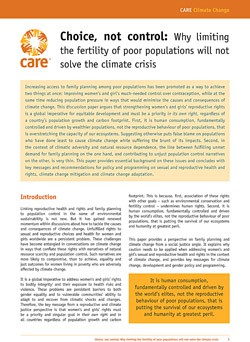CARE International, one of the world’s largest and oldest humanitarian aid organizations, has condemned programs that promote birth control as a means to reduce climate change.
CARE, which strongly supports “rights to sexual and reproductive choices and health for women and girls worldwide,” warns that efforts to link family planning to environmental objectives are undermining those very rights:
“These challenges have become entangled in conversations on climate change in ways that conflate these rights with narratives of natural resource scarcity and population control. Such narratives are more likely to compromise, than to achieve, equality and just outcomes for women living in poverty who are adversely affected by climate change.”
In a strongly worded paper titled Choice, not control: Why limiting the fertility of poor populations will not solve the climate crisis, CARE makes two fundamental arguments.
First, that population reduction programs target people who are not responsible for climate change, and direct attention away from those who are. “Action on climate change hinges on tackling inequality and the consumption patterns of the wealthiest far more than on the reproductive behaviour of people living in poverty.”
Second, that family planning programs motivated by population objectives focus not on giving women choice, but on pushing for specific outcomes, even if that violates human rights. “Decades of experience of population and environment programming have shown that rights and choices are too easily undermined when misguided natural resource management concerns drive reproductive health service provision.”
The CARE paper makes four recommendations for policies and programs related to climate change, economic development, and women’s rights:
- Reproductive rights must be a singular goal in their own right. Subordinating these rights under other objectives, such as the protection of natural resources, poses problematic and dangerous incentives which can undermine human rights, and must be avoided.
- Efforts to promote gender equality need to safeguard women’s rights and social justice in discussions on population and the environment. Programs should not use the language of gender equity and reproductive rights to legitimize policies and actions aimed at controlling the fertility of poor populations.
- Responses to climate change need to avoid victim-blaming and increasing the burden on the world’s poorest and most vulnerable populations, including the women within them. Action on climate change should draw attention to inequalities, e.g. in the global food system, carbon emissions and wealth.
- Work on family planning carried out in a context of environmental degradation and climate vulnerability must include strict safeguards for human rights, in particular reproductive self-determination, and rights to land and other natural resources. Such work should also draw attention to inequalities in the access of women and girls to the information, services and supplies they need to make reproductive decisions and choices.
Needless to say, Simon Butler and I are very pleased that arguments we made in Too Many People? have been confirmed and extended by an organization with so much experience working with the world’s poorest women, and we’re honored that CARE several times cites our book as a source.
To download the CARE paper, click on the image above.
——-
Ian




That’s quite a good paper by CARE Canada, which I have always regarded as one of the more conservative “establishment” charities.
I wonder how soon the CRA audit team will come knocking on their door?